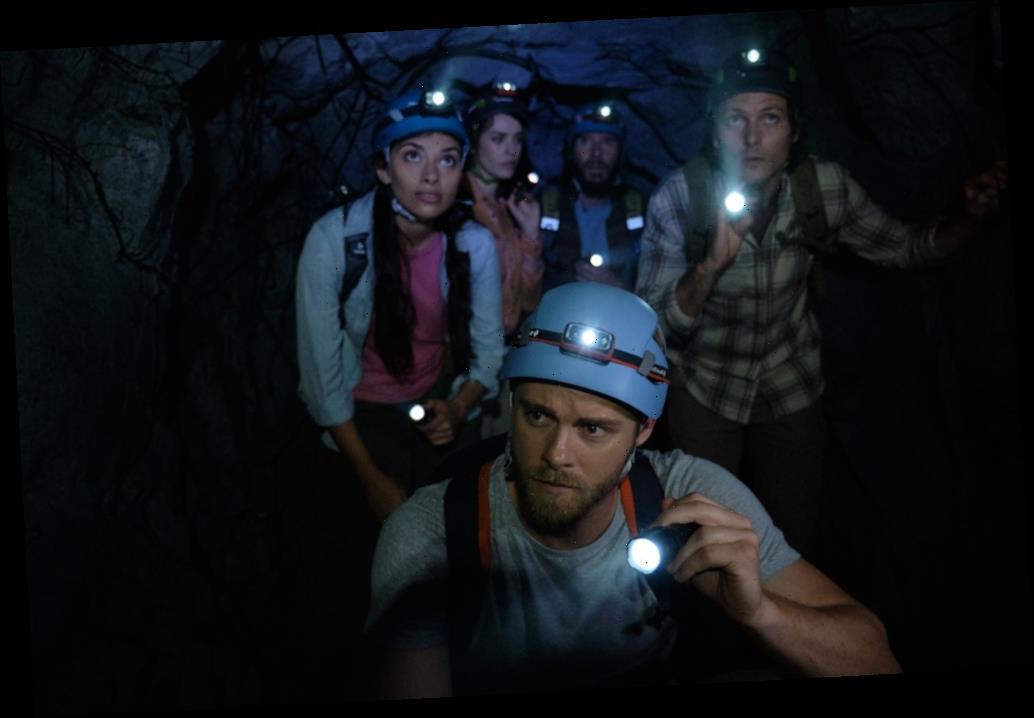The combination of claustrophobia, darkness, murky water and one big crocodile adds up to a decently scary time in “Black Water: Abyss,” Andrew Traucki’s belated followup to the abyss-less 2007 original he co-directed with David Nerlich. This time, the tasty humans are trapped in an underground cavern during a flash flood, making for a situation that’s unpleasant even before they discover they’ve got reptilian company.
While perhaps not as memorable as some of the movies it might remind you of (like “The Descent” and “Pitch Black”), this is still a tense thriller that nicely exploits a formulaic nature it doesn’t quite transcend. One of the first rollouts in several countries’ newly re-opened theaters abroad, “Abyss” will be releasing to U.S. drive-ins and on demand as of Aug. 7.
The first “Black Water” was a sleeper success primarily in home formats, its big-screen exposure probably hobbled by the near-simultaneous arrival of fellow Aussie Greg McLean’s confusingly similar “Rogue.” Both those effectively nail-biting tales saw boating day-trippers treed by a man-eater in outback swamplands, with no help forthcoming. “Black Water” added the complication of one stranded tourist being pregnant. Though its sole surviving character does not re-appear here, “Abyss” retains that plot element.
The protagonists are two athletic couples up for a weekend adventure. Actually, Eric (Luke Mitchell) and Yolanda (Amali Golden) are the truly sporty ones; respective spouses Jennifer (Jessica McNamee) and Viktor (Benjamin Hoetjes) put on a game face to tag along more out of loyalty than enthusiasm. Viktor, in particular, might prefer laying on a beach, as he’s just beaten a cancer into remission. And Yolanda has news of an expectant nature to break to him.
But they’re all prodded into spelunking instead, because Eric is gung-ho to explore a subterranean cave network his friend Cash (Anthony J. Sharpe) has recently found. Little do they realize the site was also recently “discovered” by some lost Japanese hikers (Louis Toshio Okada, Rumi Kikuchi) who accidentally fell into a cavern mouth, meeting a most unfortunate end on the other side.
Acting as guide, beardo Cash shepherds them to the well-hidden entrance in a wooded area near a lake. Then everyone rappels down from the sunlit surface to the chasm floor below. Despite varying comfort levels, all five continue through some narrow tunnels to stumble upon an underground lagoon. This would be a delightful find, if not for the fact that a tropical storm whose warnings Cash ignored has meanwhile broken above them. What he dismisses at first as mere “seepage” on the cave walls fast turns into a serious water influx, submerging the path they came in through.
But there is worse news still, which makes itself known when one of the group is seriously wounded by a you-know-what moving silently in the rising drink. Higher ground is found, but only temporarily, and in any case, the urgent need to escape and/or get help is now exacerbated by a medical emergency.
“Abyss” is sparing with the creature effects, and the gore too, although those attacks manage to be pretty awful nonetheless. Traucki knows that what’s really scary isn’t so much what we see, but what we fear we’re about to see, prolonging frightening sequences in which characters forced into the water fervently hope not to attract carnivorous attention. It is very creepsome when two of them must retrace steps by swimming now-submerged channels, fearing they might drown even if they’re not eaten. It is downright alarming when one repeatedly ducks underwater with his headlamp to see if the crocodile is gliding closer. Given its tight dark spaces, opaque water and lunging menace, this movie has plenty of natural nightmare material that it deftly turns toward more atmospheric than rote jump-scare uses.
It’s not like there’s a great deal of character detailing here, but for once, the potential cannon fodder aren’t mostly portrayed as squabbling idiots or nemeses; they behave credibly, and performances are solid all around. One misstep in Ian John Ridley and Sarah Smith’s screenplay is a soap-operatic late fillip that adds nothing to the basic narrative, driving a gratuitous wedge between some figures when they should be united by the struggle to survive. You could also argue a back-above-ground final lap goes a bit over the top. But these less judicious last 15 minutes or so are still entertaining — just not quite as suspenseful as the lean and mean material before them.
One savvy element here is more of an absence: There’s a good deal of queasy quiet on the soundtrack, as dread builds towards an imminent next attack. Michael Lira’s original score is sparingly used, but appropriately eerie and unsettling rather than histrionic when deployed.
Source: Read Full Article
